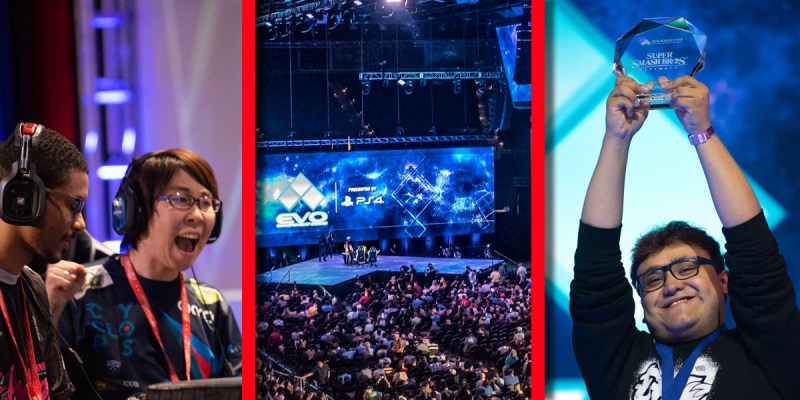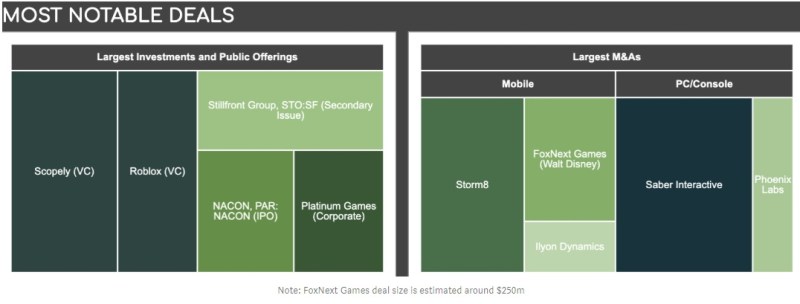The outlook for big game investments is mixed, as both demand and fear are rising. That’s one of the observations from a panel of Series A and Series B round (larger institutional investment rounds) investors at our GamesBeat Summit 2020 event.
The panel included Phil Sanderson of Griffin Gaming Partners, Michael Cheung of Makers Fund, Rick Yang of New Enterprise Associates, and moderator Eric Goldberg of Crossover Technologies. Game investments and acquisitions have been going strong, at least in the first quarter, according to data collected by Sergei Evdokimov, an investment associate at Mail.ru Games Ventures.
More than two dozen funds are investing in games these days, but these are some of the most prolific investors who are putting a lot of money into game studios and game-related startups. They invest in game companies that have demonstrated some kind of traction and already received their seed funding. Goldberg opened by asking whether it was the best of times and the worst of times.
“We’re finding the tides are rising, and they are lifting all boats,” said Sanderson, who has made about 35 game investments over the years. “A lot of mobile games and casual games are played in between work sessions in spare time. The bottom line is a lot of people have spare time now. I would say all sectors are doing well in the gaming sphere.”
June 5th: The AI Audit in NYC
Join us next week in NYC to engage with top executive leaders, delving into strategies for auditing AI models to ensure fairness, optimal performance, and ethical compliance across diverse organizations. Secure your attendance for this exclusive invite-only event.
As for revenues, Sanderson said that — among his portfolio companies — revenues are increasing, time of play is increasing, downloads are increasing, and average revenue per paying user is increasing across the board. He also noted the cost of acquiring users is down.
“Gaming is about disposable time, not necessarily disposable income,” Sanderson said. “Gaming has been eating into the share of disposable time. And now that people have more disposable time, they’re playing more games. People are spending more money in games, as well.”
Cheung, whose fund has investments across several continents, agreed with Sanderson but added that the big question is what happens after this initial surge of gaming that’s happened during the pandemic. The increase will last for a few months, but he’s watching how the high unemployment rate may trickle down and impact disposable income and game sales.
“We don’t have a good measuring stick from historical recessions or historical events,” Cheung said. “I’m keeping a good eye on in-app purchases, CPMs [cost per thousand impressions] as marketing companies pull their spending on ads, as well as premium titles. Will consumers become more price-sensitive to a $60 premium title or spend $1 or $2 in a free-to-play game?”
He said Europe and the U.S. are likely in the same boat now, awaiting more impact, while China and the rest of Asia are starting on a rebound because they were locked down earlier and are reopening a lot faster.

Above: No more live esports events.
Goldberg said that advertising revenue has dropped dramatically in every other industry. Cheung said, “We should monitor it.” Brands and other advertisers are likely to cut back, resulting in a drop in costs per install (CPI). But the net change has still been a growth in revenue. The challenge is what happens over the next year, Cheung said. So, he said, anyone offering items for sale in a game will have to closely consider what value they’re really offering for gamers in the next year or two.
Yang has made investments in esports companies such as PlayVS and Gen.G. Those companies rely on sponsorships, and those budgets may get frozen. But esports has also benefited from a rising tide of people being at home and having more time.
“This has just accelerated that curve,” Yang said. “Esports has started to show up on traditional cable TV. Now you see Formula 1 and NASCAR moving into esports, and the NBA as well. It is expanding the audience.”
Physical events have collapsed for esports, but they weren’t as high-margin as other kinds of sporting events. No traditional sporting events are happening now, either. Television shows are now putting racing games and sports video games on the air.
“Maybe those live events aren’t as important [to esports] as what people thought before,” Yang said. “In many ways, it’s not a huge blow to the industry. This gives us a chance to pause and rethink how a live event might work for esports in the future. That’s the exciting part to me.”
Stuck in the mud
Cheung said that one good thing about the pandemic for esports is that it’s forcing the industry to diversify their revenue. The ones that come out ahead will be the ones that find ways to monetize beyond the revenues that have been impacted. Just like the Warriors stood out in the NBA, it’s a good play for companies to chase after the right talent.
“It’s a forcing mechanism for the esports industry,” he said.
Yang believes consolidation will come as the stronger players acquire the weaker players. But entrepreneurs may try to fight that trend. Sanderson said that in past recessions, it took about six months for startup valuations to fall after the stock market fell.
“I believe the private company valuations will come down,” Sanderson said. “We are being a little bit cautious on valuations,” and on ad-based businesses, he said.
Sanderson said he hasn’t yet funded any companies where he hasn’t met the founders in person. That is one way that the coronavirus is slowing down game startups. He feels that’s making it hard to get to know someone who you will do business with for six to eight months. “Zoom calls work really well, but there is no replacing personal interaction and getting to know somebody,” Sanderson said.
Cheung said the team is getting more rigorous about vetting people through their partners, friends, seed investors, or other industry sources. Yang said it remains important to see teams live to get a sense for their cultures. His team hasn’t invested in startups it hasn’t met yet, and so he says that entrepreneurs should expect the process to take a little longer.
Sanderson still thinks that “hot deals” will raise money no matter what.
“When there’s an amazing company, we drop what we are doing, and we focus on that,” Sanderson said. “Those deals will happen.”
Sanderson said that startups have to preserve their cash. He said companies need to cut back spending, focusing on projects and figuring out how many people are needed for those projects.
“The only saving grace is that there are a lot of funds out there” for games, he said. “That money won’t sit on the sidelines, but it will be slower to deploy.”
As to what kind of startups they are focused on? Cheung said he is platform agnostic, backing those from PC to mobile to console. What matters more is the opportunity for the particular studio and opportunities for growth, like persistent multiplayer online games and simulations, Cheung said.
Sanderson looks at gaming infrastructure and publishers, both in the U.S. and aboard. Phoenix Labs, maker of Dauntless, was one of his investments, and it was recently sold to Garena. He has invested in gambling on esports, mobile games, and story-based casual games.




